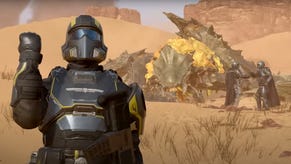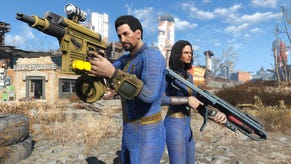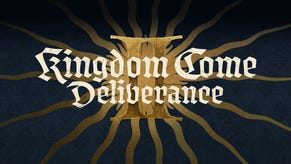Double Fine: adventures into the unknown
Double Fine has ditched the need for big publishers and the $60 boxed game model. VG247's Dave Cook speaks to the team to learn more about its grandest adventure yet.
"Ah yes, the accidental launch. Well, the feedback has been mixed, as you can imagine from a premature release. I think some people were very confused and saw an unfinished product."
From the outside looking in, Double Fine looks like a studio reborn, freed from the shackles that come with big name publishers and evil corporates that serve little purpose but to hoover up your money, stamp on creativity and slam doors in the faces of eager indie devs.
Except the San Francisco studio doesn't view the industry that way. Sure Double Fine is making success for itself by favouring digital content streams and Kickstarter, but it is absolutely open to the idea of working with big publishers again.
Double Fine is quick to stress that these big corporate entities are not evil, they're just larger and need more money to pay their staff. It's plain, old fashioned economics.
VG247 caught up with Double Fine Adventure producer Greg Rice and Middle Manager of Justice project lead Kee Chi to discuss where a studio with near-limitless freedom goes next, and why its Kickstarter project is going to be epic.
VG247: Double Fine accidentally launched its latest game Middle Manager of Justice on iOS recently, and in turn you decided to make it a beta. As you've had a chance to get feedback before the proper launch, could you consider this a 'happy accident'.
Kee Chi: Ah yes, the accidental launch. Well, the feedback has been mixed, as you can imagine from a premature release. I think some people were very confused and saw an unfinished product. Once we clarified that it's not the final product, people started sending me very constructive feedback and suggestions.
We hope to keep doing this after the game is out there, and evolve the product with the community. Last Wednesday we couldn't quite call it a happy accident, but it's definitely been incredibly helpful getting the early feedback from players.
It's a neat concept for a game. Where did it come from?
I've always loved superheroes and comic growing up. I still get really excited when any superhero games of movies come out. I also really enjoy playing simulation games, from the Kairosoft titles, to older stuff like The Movies, Theme Park, Harvest Moon and even Princess Maker.
In thinking of the title, I first thought of 'Superhero Manager – ala Football Manager – but that didn't have enough charm behind it, which eventually led to Middle Manager of Justice, and it was surprising how easily mundane office themes fit with classic superhero tropes.
It's like controlling the justice League, but in an office, and instead of the Martian Manhunter sending heroes off on missions, it's a balding middle-aged office manager.
It's also free-to-play, which is a first for Double Fine. Can you give us a run down of the monetisation model, and is this something you might do more of at the studio?
Well, it's definitely something we are trying out with the game. This doesn't mean that every game that we make from now on will be F2P, but we like to try out a lot of different things here at Double Fine.
In Middle Manager of Justice, we've been especially careful in making sure that the game is fun for the free player as well as the player that pays for in-app purchases. You can pay to speed up training and research time, or pay to get stronger heroes at earlier points in the game.
We're excited about reaching more players with the game being free, and being able to keep working on it by adding content and depth to the game.
The F2P model and the simulation genre are getting really big now, especially on PC. Why then did you decide to release Middle Manager solely on iOS?
We all play games on our iPhones and and iPads here at Double Fine. There are some incredibly fun games out there on mobile devices and we are excited to be developing games for them/ Personally, I think that a game like Middle Manager of Justice works great on a phone.
Having your superheroes training in your pocket as you wait for a bus is awesome. As you've seen, we've been expanding the platforms that we put our games on, and mobile is definitely one of the.
Thanks Kee. Can we have a chat about Double Fine Adventure Greg, as this is something that has also blown the studio's scope wide open. The amount of money you raised was incredible, but at what point did you decide you wanted to crowd-fund the game?
Greg Rice: Well we were looking at Kickstarter for about a year before we launched the project. I had a bunch of friends who had launched on Kickstarter before, and they had a lot of success there. But at the time they were doing smaller numbers – around about the kind of video game budget we would have needed to make a game.
But it wasn't until the 2 Player guys – that are doing the documentary for our Kickstarter – came to us after they had done their Minecraft documentary, and we saw that they had done over $300,000 for that, and that was something along the lines of the budget we were looking at.
So that was the catalyst that got us talking about it, and after we launched we started to see more money coming in – more than we needed to make something the scale of a Double Fine game.
What was the reaction around the office when you saw that the money was flooding in?
Yeah that was very surprising, I mean we had no idea that it would pick up that quickly. When we set up the project we looked at when it would finish – which would have been around the time of GDC – we thought we'd be using that time to really push towards our initial goal. But the fact that we had reached out target in the first day was very surprising and very exciting.
You had one target, but you ended up with so much more funding than you had anticipated. How has the extra budget changed your plans for the game's development?
When we set our goal originally it was $400,000 and we ended up getting over $3.3 million, and that definitely changed what the project was, and we had to scramble as the project was being funded, to come up for a new plan of what we could do with that amount of money.
Just because, when we were choosing the budget of $400,000, we tried to find a number that seemed reasonable on Kickstarter, that we could make something with and be proud of. - something we could happily put the Double Fine name on.
I had a lot of friends come to me when we launched, saying that they thought it was a large number and that we were crazy for asking for that much. We definitely hoped we would get more, and when we did we were very excited, but it caused a total shift in our minds of what the project was.
It went from being a project that was a small team of around three people for six months, to now being a project that would span an entire year, and with 11 people on the team.
But it also meant adding a lot of new features like new platforms, adding actual recorded dialogue for the voice-over, so we were definitely able to use that money to expand the project into something even bigger and better.
How far has the project come long since that focus shifted?
We really hadn't started before the Kickstarter launched, as we really wanted to save all that for the documentary crew, plus we didn't know what size of a game we were making, and obviously it wouldn't have done us any good to start planning up front, because our smaller game would have been a lot different to our $3 million game.
So we started in March, as soon as our Kickstarter ended, and we started brainstorming with four months of pre-production, which took us up to July.
We've been in full production now for only a few month, but we're starting to see actual levels and characters from the game, and some puzzles that you can now solve in the game. We're making progress but we're still definitely a long way off.
Tim Schafer is currently writing the script. How is that coming along?
Yeah, that has been one of the most amazing parts so far. Tim is writing the script currently and he is a brilliant writer. The script is one of the least things I'm worried about as I'm sure it will be brilliant, and full of amazing characters.
But yes it has been an amazing process because we have been very open with it and we've shown concept art of the main characters, gotten feedback from our backers on Kickstarter and yeah, it's been great.
Double Fine Adventure and your approach to Kickstarter really does underline the studio's new direction. At what point did the team decide that it would focus predominantly on digital, and take the almost-indie approach that you're taking now?
The first two games that Double Fine put out were large disc-based games for consoles, and the plan after Brutal Legend was to do Brutal Legend 2. When that got cancelled we had to shift and sort of figure out what we were going to do next.
So the decision was made to split the team down into smaller teams and work on these smaller games. We started what we call the 'Amnesia Fortnight', where we split the entire company up into four teams and have everybody who wanted to pitch a game, pitch a game to Tim – basically anything they wanted to work on.
This process ended up producing Costume quest, Stacking, Iron Brigade and Once Upon a Monster. So we spent two weeks thrashing those ideas out, and then pitched to publishers and all of them got signed. Ever since then we've been split into smaller teams that work on multiple projects at once, and that's been a really exciting process for us.
Are you able to tell us more about what stage Brutal Legend 2 was at when it was canned?
It was just at the brainstorming phase. That happened shortly after Brutal Legend was launched, and we then split the team up and started the Amnesia Fortnight method.
Brutal Legend was the last Double Fine game that fit the big budget, '$60 boxed game' stereotype. Is that a format you might return to in future?
Yeah, we definitely haven’t shunned the $60 boxed game, and it's something that we could totally come back to in the future. But what I think is exciting with what we've been doing recently is that, we've been able to try a lot of different things.
We've done Kinect game, we've done mobile games, PC, and we're now doing iOS. We're looking at free-to-play stuff, so it's been cool to experiment with our business models, just as much as we've experimented with our games. So yeah, we definitely could – one day – do a boxed game.
It's neat that you guys are trying so many different things considering that many of the team have roots back in classic adventure games. We actually saw a recent quote from Ron Gilbert – who I know has worked with Tim a lot – saying that Doom is responsible for a dip in the adventure genre during the mid '90s.
"The plan after Brutal Legend was to do Brutal Legend 2. When that got cancelled we had to shift and sort of figure out what we were going to do next."
That was because it brought the notion of faster-paced action games to the table. Is that fair to say do you think?
I think that the console market has totally shifted towards larger, triple-a, polished experiences and definitely has more of an emphasis on action-based gameplay. But those games have started adopting things from the adventure genre over the last few years.
You see these big shooters that are relying a lot more on story, and action games that have more character-based stories. I think that the adventure genre has definitely primed the audience for narrative based games, and thanks to the variety of tablet and touch devices today, it makes sense to have new adventure games on those things.
But yeah I think that while action-based games have been more popular in recent years, the rise of the indie scene has shown that people are looking for new and unique experiences, and are willing to give anything a shot, even if it's a unique idea they haven't seen before.
Indies are a bigger part of the industry now than they were perhaps five or ten years ago, and there's a very simple, obvious – but very applicable – quote on your Kickstarter page that states, “Big games cost big money.”
If the industry is trying to nurture indie talent, why are so many platforms essentially slamming doors in the faces of eager studios by making routes to market so expensive?
For any developers, things like Steam and iOS are much more open platforms, and they're such a huge deal because they are places for indies to launch their games easily, and to give them a wide reach.
Platforms have – typically in the past – been difficult to get on, and have a lot of hoops to jump through in order to publish your game. That can be tough for indies for sure, but I think times are definitely changed and that I'd imagine that the industry is looking at iOS or Steam, and seeing the succes that people are having on there, then re-evaluating their practices.
What's your opinion on OUYA and Android as easier routes to market for indies?
I think they definitely fall in line with the spirit of what we've done with Double Fine Adventure and we're always looking to be very open and offering our product in a way that fans can can get better access.
But yeah, with Double Fine Adventure, our engine I called Moai, and it's an open source engine that will allow us to launch on multiple platforms at the same time. The engine is available to anyone who wants to use it and ultimately we're building a lot of tools for our game that will then be open sourced back into the Moai engine.
Should more developers consider removing the 'red rope' like that and give the public and other budding devs access to the studio – be it through tech or just a general insight into their inner workings?
Yeah I mean it's different for everyone but we here at Double Fine like to be very open and to speak honestly and openly with our fans. It's been good for us.
One thing that comes up a lot when people talk about Double Fine is sequels to games like Psychonauts, and it's clear that people really want to see some of your old titles brought back. Is that demand from the gaming public validation that you've done something right?
Yeah that's definitely flattering, and Tim has ideas for sequels to every game we've ever made. I think it always comes down to what kind of studio resources are available, and who's available to make games.
But yes, Psychonauts 2 is something that comes up a lot and it's something that we'd definitely be interested in doing. It'd just be a large game, and that'd mean pretty much the entire studio working on it for multiple years, so it's just a matter of finding funding and finding out how to take it forward.
There is this weird view from many gamers that developers shouldn't release games just to make money - and that the desire to make a profit is seen as greed – when in reality, making money is a necessity because, well, you are a business at the end of the day.
It's not so much that we'd make games to make money, the real issue is having the money to make the game. It's not like, 'oh yeah, we want to make Psychonauts 2.
Well, someone has to pay us a ton of money to make us rich first'. We need that money to pay our employees so that we can have them around and have their salaries paid while we ake the game.
The same is true of sequels. Like, if a developer announces a sequel, some gamers approach that with caution and might say, 'oh, this is a cash cow, they're only doing this for money.' At the end of the say it's an entertainment business and you're right, you do need to pay people's wages.
I think there are definitely more Psychonauts stories to be told, and Tim has them in mind. Obviously fans like the game and we'd love to revisit the franchise too, and...we love it as well.
So in Double Fine Adventure, what does the word 'Adventure' mean to you? What defines a strong and memorable adventure game today?
We talked about this a lot, and a few of those discussions have been released in our Kickstarter documentary. But I think it's different to everybody, but pretty much everyone we've talked with agrees that adventure games have a focus on narrative, story and character development.
One of the most important things in the game is that you're telling a story and letting a player get absorbed into a world. We then have everything else like your inventory, puzzles, dialogue trees – but these aren't necessarily what defines an adventure game.
Some adventure games have them, some don't, but with Double Fine Adventure specifically, I think 'Adventure' references the adventure in the game itself, but also because it's going to be an adventure for our fans in that we're allowing our backers to take part in development of the game, and to give them access behind the scenes.








.jpg?width=291&height=164&fit=crop&quality=80&format=jpg&auto=webp)


